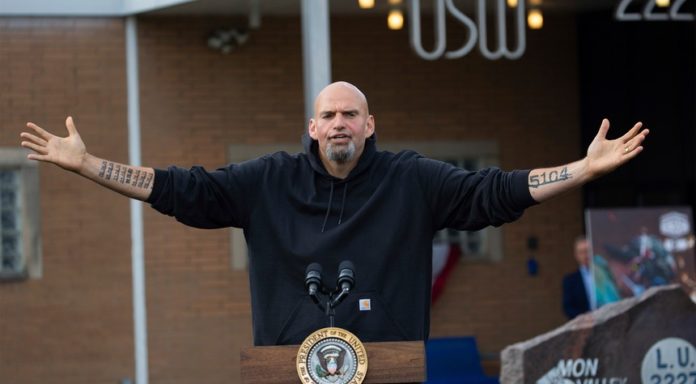We reported previously that some mainstream media members have become fed up with John Fetterman’s evasive tactics to avoid answering reporters’ questions about his health, four months after he had a stroke.
“Mr. Fetterman is asking voters for a six-year contract without giving them enough information to make sound judgments about whether he’s up for such a demanding job,” the Washington Post editorial board wrote Monday. “We have called for full disclosure of health records from candidates for federal office in both parties… and we believe Mr. Fetterman should release his medical records for independent review.”
The Pittsburgh Post-Gazette had said the exact same thing a week before. They observed that voters have the right to find out if their potential senator is capable of performing the job, including managing the exchanges in a lively debate.
The New York Times is now involved in the action. Although the piece they wrote was more sympathetic to Fetterman than the WaPo or the Post-Gazette they still inadvertently highlighted the main problem with his campaign (aside from his stances on issues). Notice how Fetterman stated to the paper that he’s been open about his health. We learn later that his campaign did not allow his doctors to be available for media interviews.
Mr. Fetterman stated Tuesday that he has never hidden any health issues.
His campaign didn’t make Mr. Fetterman’s doctors available for interviews. Attempts to reach them separately were also unsuccessful. Alliance Cardiology’s Dr. Ramesh Chaudra signed the June letter regarding Mr. Fetterman’s heart condition. According to Dr. Chandra’s office, health privacy laws prohibit him from speaking with patients without their consent.
This is the main problem. It goes beyond his Senate campaign and how his staff would respond to requests for information regarding his health after he assumed office. Serving in public office, particularly in the United States Senate is not an easy job, as many in the media have noted. You must be able to handle the daily demands of the job, including responding to media inquiries and being available to answer questions from the media as well as your constituents at any time.
A stroke can be very debilitating. This is especially true when you are in the middle of a campaign and have to present your case to voters before Election Day. As we approach November, Fetterman is getting closer to Dr. Mehmet Oz, a sign that Oz’s strategy of questioning Fetterman’s ability to serve and countering Fetterman’s “carpetbagger” claims may be paying off.
Fetterman’s sloppy debate style and insistence on Oz having them (late October) is not only a problem. Fetterman’s erratic behavior on debates and when he and Oz will have them (late October) could lead to some fence-sitters deciding that he might not be up to the task.
The media push to Fetterman be more open about his health and raise questions is a welcome development in a race that has spent most of its time trying to help him by dumping on Oz. It is yet to see if Fetterman’s push results in some real forthrightness.
Stay tuned, as always.




